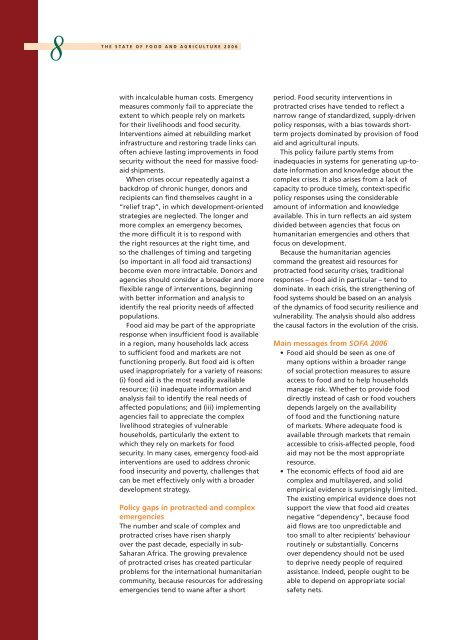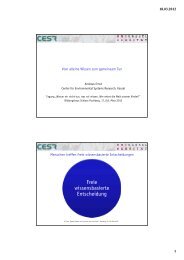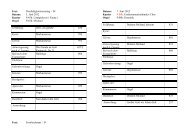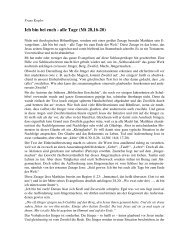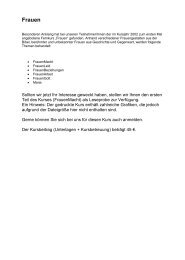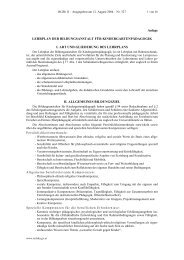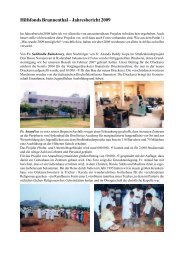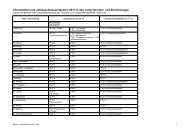The State of Food and Agriculture - FAO
The State of Food and Agriculture - FAO
The State of Food and Agriculture - FAO
Create successful ePaper yourself
Turn your PDF publications into a flip-book with our unique Google optimized e-Paper software.
8<br />
THE STATE OF FOOD AND AGRICULTURE 2006<br />
with incalculable human costs. Emergency<br />
measures commonly fail to appreciate the<br />
extent to which people rely on markets<br />
for their livelihoods <strong>and</strong> food security.<br />
Interventions aimed at rebuilding market<br />
infrastructure <strong>and</strong> restoring trade links can<br />
<strong>of</strong>ten achieve lasting improvements in food<br />
security without the need for massive foodaid<br />
shipments.<br />
When crises occur repeatedly against a<br />
backdrop <strong>of</strong> chronic hunger, donors <strong>and</strong><br />
recipients can find themselves caught in a<br />
“relief trap”, in which development-oriented<br />
strategies are neglected. <strong>The</strong> longer <strong>and</strong><br />
more complex an emergency becomes,<br />
the more difficult it is to respond with<br />
the right resources at the right time, <strong>and</strong><br />
so the challenges <strong>of</strong> timing <strong>and</strong> targeting<br />
(so important in all food aid transactions)<br />
become even more intractable. Donors <strong>and</strong><br />
agencies should consider a broader <strong>and</strong> more<br />
flexible range <strong>of</strong> interventions, beginning<br />
with better information <strong>and</strong> analysis to<br />
identify the real priority needs <strong>of</strong> affected<br />
populations.<br />
<strong>Food</strong> aid may be part <strong>of</strong> the appropriate<br />
response when insufficient food is available<br />
in a region, many households lack access<br />
to sufficient food <strong>and</strong> markets are not<br />
functioning properly. But food aid is <strong>of</strong>ten<br />
used inappropriately for a variety <strong>of</strong> reasons:<br />
(i) food aid is the most readily available<br />
resource; (ii) inadequate information <strong>and</strong><br />
analysis fail to identify the real needs <strong>of</strong><br />
affected populations; <strong>and</strong> (iii) implementing<br />
agencies fail to appreciate the complex<br />
livelihood strategies <strong>of</strong> vulnerable<br />
households, particularly the extent to<br />
which they rely on markets for food<br />
security. In many cases, emergency food-aid<br />
interventions are used to address chronic<br />
food insecurity <strong>and</strong> poverty, challenges that<br />
can be met effectively only with a broader<br />
development strategy.<br />
Policy gaps in protracted <strong>and</strong> complex<br />
emergencies<br />
<strong>The</strong> number <strong>and</strong> scale <strong>of</strong> complex <strong>and</strong><br />
protracted crises have risen sharply<br />
over the past decade, especially in sub-<br />
Saharan Africa. <strong>The</strong> growing prevalence<br />
<strong>of</strong> protracted crises has created particular<br />
problems for the international humanitarian<br />
community, because resources for addressing<br />
emergencies tend to wane after a short<br />
period. <strong>Food</strong> security interventions in<br />
protracted crises have tended to reflect a<br />
narrow range <strong>of</strong> st<strong>and</strong>ardized, supply-driven<br />
policy responses, with a bias towards shortterm<br />
projects dominated by provision <strong>of</strong> food<br />
aid <strong>and</strong> agricultural inputs.<br />
This policy failure partly stems from<br />
inadequacies in systems for generating up-todate<br />
information <strong>and</strong> knowledge about the<br />
complex crises. It also arises from a lack <strong>of</strong><br />
capacity to produce timely, context-specific<br />
policy responses using the considerable<br />
amount <strong>of</strong> information <strong>and</strong> knowledge<br />
available. This in turn reflects an aid system<br />
divided between agencies that focus on<br />
humanitarian emergencies <strong>and</strong> others that<br />
focus on development.<br />
Because the humanitarian agencies<br />
comm<strong>and</strong> the greatest aid resources for<br />
protracted food security crises, traditional<br />
responses – food aid in particular – tend to<br />
dominate. In each crisis, the strengthening <strong>of</strong><br />
food systems should be based on an analysis<br />
<strong>of</strong> the dynamics <strong>of</strong> food security resilience <strong>and</strong><br />
vulnerability. <strong>The</strong> analysis should also address<br />
the causal factors in the evolution <strong>of</strong> the crisis.<br />
Main messages from SOFA 2006<br />
• <strong>Food</strong> aid should be seen as one <strong>of</strong><br />
many options within a broader range<br />
<strong>of</strong> social protection measures to assure<br />
access to food <strong>and</strong> to help households<br />
manage risk. Whether to provide food<br />
directly instead <strong>of</strong> cash or food vouchers<br />
depends largely on the availability<br />
<strong>of</strong> food <strong>and</strong> the functioning nature<br />
<strong>of</strong> markets. Where adequate food is<br />
available through markets that remain<br />
accessible to crisis-affected people, food<br />
aid may not be the most appropriate<br />
resource.<br />
• <strong>The</strong> economic effects <strong>of</strong> food aid are<br />
complex <strong>and</strong> multilayered, <strong>and</strong> solid<br />
empirical evidence is surprisingly limited.<br />
<strong>The</strong> existing empirical evidence does not<br />
support the view that food aid creates<br />
negative “dependency”, because food<br />
aid flows are too unpredictable <strong>and</strong><br />
too small to alter recipients’ behaviour<br />
routinely or substantially. Concerns<br />
over dependency should not be used<br />
to deprive needy people <strong>of</strong> required<br />
assistance. Indeed, people ought to be<br />
able to depend on appropriate social<br />
safety nets.


